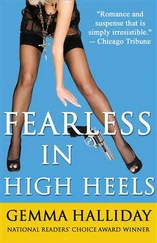“It’s Mr. Lobell,” young Betty said in an intense low tone. She had entered all the way into Max’s office to deliver this news. “He’s on one.”
Max turned away from Jeff’s desk as he lifted the receiver, hiding his face from his dead partner’s post, so that Jeff wouldn’t see him turn down Nutty Nick. Max didn’t believe in ghosts, but why take a chance? “Mr. Lobell?”
“Just a moment,” a male voice said. Silence, then a booming voice: “Hello!”
“Mr. Lobell? This is Max Klein.”
“Hi. How are you? You look all right. I just saw you on CNN in front of your apartment building. With your son. Where’s he going on the bus? To camp? Isn’t it late for camp to be starting?”
“It’s a day camp.”
“Isn’t he old for day camp?”
“No one’s too old for day camp.”
Lobell’s big voice chuckled. “Hee — hee — hee,” he laughed in a deep tone, like a storybook giant. “Well, he has a very brave father. I’m glad you weren’t hurt. But I’m sorry, very sorry about Mr. Gordon. I liked him.”
“He was a good—” Max stopped himself. Lying was so easy; almost impossible to avoid. “He was a close friend,” he amended.
“I also wanted to tell you not to worry about the presentation. I’ve made other arrangements.”
“You’ve hired other architects?” Max was startled, not upset. That had been quick. It meant there had been competition all along, racing beside them at the same pace.
“Yes. Other things being equal, if the designs you came up with were as good as what you did with the Long Island store, I probably would have hired you, but — well, to be honest, I’m a superstitious man. I’m sorry. You don’t need to hear any more bad news, but I felt I owed it to you to tell you directly.”
“What do you mean,” Max wondered, partly to himself, although he spoke aloud, “that you’re a superstitious man?”
“You know. Anyway, I expect a bill for the preliminary drawings. Please extend my sympathies to Mrs. Gordon—”
“Excuse me.” Max couldn’t let this mystery go. “What do you mean, I know? I don’t know what you mean when you say you’re superstitious.”
“Well, you were on your way to see me and you couldn’t get here. So I feel there’s a jinx…” The giant’s voice hesitated, flustered by embarrassment.
“You mean I’ve got bad luck and you don’t want to catch it?”
“No, no, no,” the giant said, almost chuckling. He had the false good cheer of a man in a Santa Claus suit. “This project requires a lot of immediate attention. Obviously you’re going to need time to adjust to this tragedy. We’ll work together in the future. Thank you for—”
“Yeah, goodbye,” Max hung up rudely. He hadn’t felt angry until Nutty Nick lied. In fact, he had been grateful to hear his previous, truthful statement of worry that Max was jinxed. Max had survived all these attempted killings; he thought he was lucky to be alive, that he was overflowing with good fortune. That was wrongheaded. Nutty Nick was right. All these events were bad luck. He was dogged by bad luck, by the malicious actions of an evil god.
Was it punishment? The therapists would line up from New York to China to tell him it wasn’t. But they wouldn’t make much of a living informing their patients that they deserved their fates.
Okay, it is punishment, Max decided. What for? What did he do? Abandon his ambitious plans? No, not for that. Everyone had jumped off the ship of ideals. A huge asteroid would be on its way to pulverize the earth if that were a serious crime.
Gladys interrupted. “Max, a Mr. Brillstein is on the phone. He says he’s your lawyer.” She had her hands on her hips again, a scolding posture.
“I’m sorry you don’t approve,” Max said.
“It’s not up to me to approve,” Gladys flung her hands out, tossing the subject away. “Maybe you should close the business. I just think you shouldn’t be making decisions right now. You shouldn’t turn down a job like Nutty Nick, the kind of success you’ve worked so hard for. You’ve wanted a job like that for years. You’ve killed yourself to get it—” She was revved up, pacing in a tight circle, full of passionate feeling and mistaken history.
“Gladys—” Max stopped her, hand up, a smile on his face. “Mr. Lobell called to tell me that, because of the crash, he isn’t hiring us.”
“What?” Gladys asked this of the rug, as if something hideous and unknown had erupted at her feet.
“And, believe me, I wasn’t working hard all these years to figure out the best way to display programmable VCRs next to microwave ovens.”
Gladys ignored his sarcasm, because that’s all it was to her, Max realized. All these years she had thought his most profound statements were the talk of a wise guy. “He’s not giving you the job because of the crash?”
“Well, we’re jinxed. We’re on our way to see him with the prototype drawings and the plane crashes. Who wants to invest millions in a design scheme made up by people with such bad luck?”
“That’s disgusting.” Gladys mumbled this as she shuffled out. She slumped, aging as she walked away. She was beaten. She had encountered a human act that was beyond her comprehension. “What a disgusting man,” she said almost to herself.
Max was amused. He smiled at her exit. “He’s perfectly normal, Gladys,” he called out.
Gladys stopped just beyond the doorway. Her evenly divided black and gray hair, pulled back into a bun, seemed to have turned mostly gray. He was sorry to have teased her. She used to mother Jeff. He would hug her affectionately, complain in a teenager’s whine if she nagged him, and ask her advice (which he never followed) about his children. For a moment, Max thought she was going to cry. “Don’t forget,” she said softly, discouraged, “Mr. Brillstein is on the phone.”
Max picked up. “Mr. Klein,” Brillstein seemed to be in the middle of a long monologue. “I’m glad I got you. There’s paperwork we should take care of right away. I didn’t want you to be bothered last night, but I’ve got — you know, it’s annoying but there are some papers you have to sign. Could you come by — I’m near you — or maybe I could come over?”
“Max—” This time it was young Betty. Even with his polo shirt back on she seemed fascinated by his chest. What was she searching for? His heart? “I’ve got four calls for you. Everything’s lit up.”
Meanwhile Brillstein hadn’t paused in his ear: “Nothing important. By the way, has an FAA investigator gotten to you yet? Mrs. Gordon had one at her place first thing in the morning. A little tacky, I thought, a little early for that stuff. By the way, we have to give up any idea of Mr. Gordon’s death taking time — they know he was killed instantly.”
“Sorry about that,” Max said and told Brillstein to hang on. “Who are all the calls?” he asked Betty.
She had her head tilted to the side and was staring at his chest wistfully. “What?” she came out of a reverie, startled. “Oh. Two of them I think are lawyers.” She shrugged her shoulders. “I can’t get them to really say who they are or what they’re calling about.”
“Get rid of any lawyers. They want to sign me up.” Betty’s young face was at last wrinkled — by a crease of puzzlement across her forehead. Max pointed toward the sky. “To sue.”
“Oh…!” Betty sighed with relief. She was quickly appalled. “God, what pigs.”
“Wait for a second.” Max returned to Brillstein. “I’ve got lawyers coming out of my phone lines. What do I tell my secretary to say to get rid of them?”
“No kidding,” Brillstein was grim. “Ugh. What a business. Well, I guess I can’t be too holier than thou. What should she say? Have her tell them you have a lawyer. That might , I emphasize might , get rid of them.”
Читать дальше












